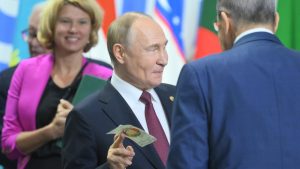China Saved Turkey’s Nuclear Project From EU
 A file picture shows the construction of the Russian-built Akkuyu Nuclear Power Plant in Mersin Province. (AFP)
A file picture shows the construction of the Russian-built Akkuyu Nuclear Power Plant in Mersin Province. (AFP)
On September 11, Anadolu Agency reported that the construction of Turkey’s first nuclear power plant may face delays due to the European Union’s sanctions on Russia. Fortunately, Turkey has found alternative products in China.
Turkish Energy and Natural Resources Minister Alparslan Bayraktar noted that more than 90% of Turkey’s first nuclear reactor has been completed. However, progress is being hampered due to a delay in the delivery of key equipment from Germany’s Siemens, which is needed to facilitate the transmission of electricity at the construction site, thereby slowing down the overall project.
Siemens Energy has not provided an official reason for withholding the parts, though it is speculated that the delay may be tied to sanctions on Moscow. The project is being carried out by Rosatom, Russia’s state-owned nuclear energy company, which has led European and American media to claim that the equipment could be shipped to Russia, with profits from the project allegedly funding the war in Ukraine.
Bayraktar criticized the situation, stating, “A decision has been made based on a political stance, despite there being no legal grounds or international sanctions related to the issue.” He added, “This matter has been raised at the highest level!”
Nuclear energy plays a critical role in Turkey’s goal of achieving net zero emissions by 2053. In addition to the Akkuyu plant, which is under construction in the Mediterranean province of Mersin, Turkey plans to build nuclear plants at two other locations.
An intergovernmental agreement between Russia and Turkey for the Akkuyu Nuclear Power Plant (NPP) was signed in May 2010. The plant will consist of four VVER-1200 power units, with a total installed capacity of 4,800 megawatts (MW). Construction began in 2013 and gained momentum in 2018.
Last year, nuclear fuel was loaded into the first power unit. Once operational, the plant is expected to supply around 10% of Turkey’s electricity needs.
While Turkey had initially planned to launch its first reactor in 2023, delays have pushed this target to 2024. The remaining reactors are scheduled to be operational by the end of 2028, despite Turkey being a NATO member.
To ensure the country meets its net zero emission targets, Rosatom has already signed agreements with Chinese companies to produce equivalent parts, although Bayraktar did not disclose the names of these companies.
Bayraktar also mentioned that Turkey might reconsider Siemens Energy’s involvement in future projects and could even impose fines, despite the company’s long-standing presence in the Turkish market.
In July, Turkish President Erdoğan stated that Germany was withholding certain components needed for Turkey’s nuclear plant, leaving them stuck at customs. On his return from a NATO summit in Washington, Erdoğan told reporters that he had raised the issue with German Chancellor Olaf Scholz, stressing that the delay was causing significant frustration.
China-made components, initially considered as alternatives for Turkey’s nuclear plant, are now offering hope for Turkey’s environmental goals. However, Bloomberg has criticized this development as a sign of Turkey strengthening its ties with China and Russia following its bid to join the BRICS group. If such an inverted logic holds true, one might wonder: How will Bloomberg criticize Germany’s Siemens for providing Turkey with an excuse?
Hopefully, Bloomberg will indeed criticize Siemens for this.
Editor: Charriot Zhai



